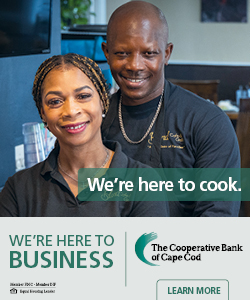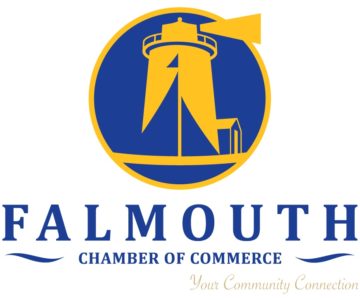By Douglas Karlson
Jan Aggerbeck is something of a coffee connoisseur. Growing up in Denmark, that’s to be expected. Danes drink a lot of coffee. “It’s easily five times a day, if not more,” he says.
So when the former Silicon Valley CEO was looking to acquire a business with growth opportunity, Cape Cod Coffee hit the spot.
“It was the best coffee I’d tasted,” he recalls of his and his wife, Pam’s decision to buy the company in 2015. It was founded in 1970 and moved to Mashpee in 1986.
With a background in turning companies around, Jan realized he could expand the company’s offerings and reach. All that was needed was fresh management and an infusion of capital.
“If the product is there I can do the rest,” thought Jan.
Since purchasing the company, it has tripled its sales, and Jan predicts it will double again in two years. It’s also grown from four to more than 20 employees. “We will likely double that this year,” he predicts.
To achieve that growth, the company has focused on quality coffee, excellent service, engagement with the local community, sales and marketing outreach beyond Cape Cod, and scaling up to meet the demands of commercial clients.
Jan focuses on sales and marketing, and Pam, in addition to her work as an operating room nurse at Brigham and Women’s Hospital in Foxboro, focuses on HR and public events. “But we’re still small enough that we both wear about 20 hats,” says Jan.
At its roasting facility in Mashpee, Cape Cod Coffee has expanded its capacity and can now process up to 20,000 pounds of coffee per day using coffee beans that come from Central America, South America and Africa as well as India and Indonesia.
The roasted coffee is sold in one and five-pound bags as well as recyclable K-cups. The Aggerbecks carefully manage the inventory to ensure that coffee is always fresh, which Jan says is essential.
Cape Cod Coffee sells primarily to wholesale accounts: coffee shops, restaurants, and hotels and resorts. Cape Cod Coffee’s sales team covers all of New England and well as New York and New Jersey. The company also has a small café in Mashpee Commons and a large café in Barnstable Airport, and plans are in the works to open a restaurant in Mashpee Commons to serve breakfast and lunch.
Shifting tastes
Back in 1986, Jan notes that Cape Cod Coffee offered just two options: regular and decaf. The company now offers more than 40 choices. He says coffee drinkers increasingly demand more variety and greater quality, and compares the coffee industry to the beer industry in the way customers have grown increasingly discriminating.
In addition to quality flavor, customers are interested in coffee that is single origin (from the same farm), and grown without the use of chemicals and according to fair trade practices. Cape Cod Coffee uses only natural flavors, no sugar, and no syrups.
Jan touts the health benefits of good coffee, and encourages people to drink it black.
“If it’s good coffee you don’t need milk and sugar,” adds Pam, who says she too is a coffee lover, having grown a passion for it after meeting Jan.
Cape Cod Coffee’s competitors include large distributors like Sysco and Boston’s Best Coffee. But Jan maintains their biggest competitor is the status quo. Convincing a customer to switch from one coffee vendor to another isn’t easy.
To persuade customers to switch to their brand, Pam and Jan set up tastings as often as possible. “If you really want to convert people they have to try it,” says Jan. Excellent service is essential, too, and the company has a service department that is the same as larger competitors.
For customers on the Cape, being local is an important selling point, though even local businesses are also often reluctant to change vendors. “You would be surprised how many businesses on Cape don’t source locally,” observes Jan.
Community engagement
When it comes to stressing the value of using local vendors, the Aggerbecks practice what they preach. “We do everything local,” says Pam. They seek local vendors for their own business, whether it’s donuts, soap, or partnering with Cape Cod Beer to produce a coffee-flavored beer.
Cape Cod Coffee participated in about 200 events per year. Last year, the events that Cape Cod Coffee took part in raised about $2 million for charities, says Jan. He himself spends a considerable amount of time helping community organizations. He sits on the board of the Cape Cod Chamber of Commerce and is a mentor at Entrepreneurship for All.
“We’re believers in giving back,” explains Pam “It’s fun when we go to events and people say ‘thank you so much.’”
That approach was recognized by the Retail Associations of Massachusetts in 2016 when it awarded Cape Cod Coffee with the Award for Advertising and Promotion for “unparalleled creativity in business marketing.”
Bigger is better
Cape Cod Coffee relies on a large state-of-the-art roaster that produces larger quantities at a higher consistency than smaller competitors. In addition, to land commercial accounts, Jan says coffee distributors must provide industrial Bunn coffee makers that cost about $2,000 each. That’s a significant investment, as some resorts requires as many as five coffee machines.
The company has also made efforts to expand off-Cape to offset the seasonality of Cape Cod. Increasing business in the off-season allows the company to hire year-round employees. Jan notes that it’s much less of a challenge to find and retain good employees on a full-time basis compared to summer only.
Full time year-round employees also become more skilled. “It’s easier to get quality of service when they’re here all year,” explains Jan. “We want people to feel they’re part of something.”
Advice
Their advice for someone interested in purchasing a business? Find something you’re passionate about,” says Jan, and be prepared to put in 60 to 70 hours of work per week at first. He also recommends using a free mentor from Entrepreneurship for All. Prepare a marketing plan, look for hidden costs, and know your customers, stresses Pam.
While they want to grow, Jan says they also want to keep their business manageable. He says he’s run billion-dollar companies before, and that’s not what he’s interested in.
“We want to keep it personable. We’re truly a partner in your business. We’ve embraced the Cape Cod community and they’ve embraced us,” says Pam.























